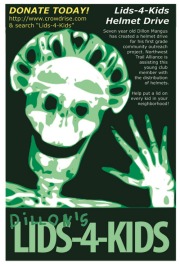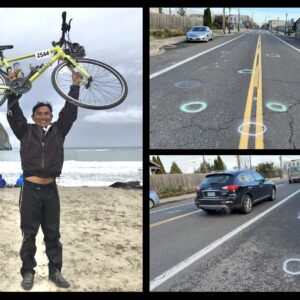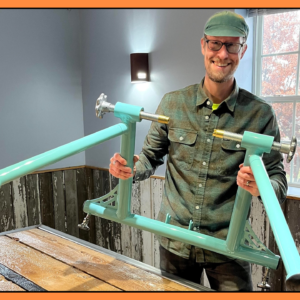
7-year old Dillon Mangus might be Portland’s youngest bike safety advocate. Dillon, a first-grader at Ainsworth Elementary in Southwest, has launched the “Lids-4-Kids” fundraiser to provide helmets for kids in need.
Students at Ainsworth are required to complete a community outreach project. When Dillon saw one of his classmates riding without a helmet, a light bulb went off and he knew he’d found his project. With the help of his family and friends, Dillon even came up with a tag line: “Keep the goo on the inside!”. He has also created a fundraising page at CrowdRise.com and hopes to raise $5,000 by June 1st.
The money raised will be used to purchase helmets that will be given to kids in need during the upcoming Sunday Parkways events. To fulfill his class requirement, Dillon will also present what he has learned about helmets and bike safety to his classmates.
The Northwest Trail Alliance (Dillon’s dad Matthew is the marketing manager for the group) will help Dillon purchase and distribute the helmets.
To get a helmet, all kids need to do is download the application from the Northwest Trail Alliance website and bring it to their table at Sunday Parkways.
I caught up with Dillon at the recent PDX Bicycle Show. He told me he decided to do this “Because not all kids have helmets,” and that it’s important to wear one becuase, “They need their brains.”
The project has already raised nearly $1,000 toward its goal. Learn more and donate to the cause at CrowdRise.com.








Thanks for reading.
BikePortland has served this community with independent community journalism since 2005. We rely on subscriptions from readers like you to survive. Your financial support is vital in keeping this valuable resource alive and well.
Please subscribe today to strengthen and expand our work.
Nice write up, great job Dillon!
But how many people actually get permanent brain damage from cycling each year? Does anyone really know?
We do know that cyclists live longer. If anyone is put off from cycling because of helmet campaigns, that’s actually costing lives, not saving them.
OK, you go tell that to the kid that is trying to do a cool project.
does it harm you to wear one?
so if even one person benefits and nobody is harmed, it sounds good to me. If you could, would you spend 70 bucks if you knew it would prevent one person’s brain damage?
You realise that much helmet support is emotional in nature, right?
Nanny state indoctrination sure starts young these days…
Dillion really cares of others… he is raising money to buy helmets for kids in need he is not looking for trouble. Kids under 16 in Oregon are required to wear helmets anyway.
Anti helmet posters, don’t impose your beliefs on the rest of us as you don’t want those of us that wear helmets to impose our beliefs on you. Helmets are required under Oregon State Law for children. Stop harshing on Dillon, the kids doing a great thing helping other kids.
Fred, it’s not about beliefs. It’s about facts. So. How many people actually get permanent brain damage from cycling each year?
Erik, perhaps you can supply those numbers since you seem to question helmet effectiveness?
Erik – you have made your point, many times here. Move on.
I think he gets an ego boost from “besting” some little kid’s project.
Linda, actually I don’t comment a lot on BikePortland but I do think it would be nice if Jonathan would write a little more about helmet science. Wikipedia is a good place to start, and cyclehelmets.org has some more recent developments.
Anyway, how many snide comments before someone actually tells us how many cyclists get permanent brain damage each year?
Lord Erik, it’s like you’ve never heard of google. Here you go:
Citation- http://pediatrics.aappublications.org/cgi/content/abstract/98/5/868
Well done rider. Gold star. I hadn’t seen that study.
It talks about deaths and head injuries, but not permanent brain damage (which distinguishes this kind of injury from ones that heal, such as a broken arm).
Nine out of ten cyclists died in a motor vehicle collision and motor vehicle injuries are the leading cause of death among children in the U.S. And as I wrote in my first comment, cyclists live longer.
To me cycling is not the problem, it’s the solution.
Seriously? Well obviously, the deaths fall under permanent brain injury. And permanent brain injury can be very difficult to diagnose, especially in children whose cognitive function is still developing. What level of brain damage in a child is enough for you to accept it as significant?
Also, why are you taking such a myopic view of the benefits of helmets? I would say that if wearing a helmet prevents one trip to the ER then that’s a lowered shared cost to the system.
I think this is a pretty cool project and even cooler that it’s being spearheaded by such a young kid.
Eric, Why would we only worry about “permanent brain damage”? Why are you stuck on that? Because you’ve looked far and wide and can’t find the answer? Big deal.
Kids crash their bikes. They’re learning. I don’t see why putting a lid on their little heads should threaten anyone. I think Dillon’s efforts should be commended.
Jeff TB, cyclists wear helmets but not other protection. The justification for this, as I understand it, is that people are afraid of injuries that won’t heal, ie permanent brain damage. They are not so scared of a broken arm.
If you wear a helmet to prevent non-permanent injuries, it makes sense to protect everything and look like the michelin man.
I wear a helmet because my brain is one of the few parts of my body that I cannot function without, or cannot be replaced. That’s my justification. I’m sure other riders have their own, different justifications. All riders are not the same, and even those that exhibit the same behavior may be doing it for different reasons.
I’m a helmet agnostic who thinks this kid is doing a nice little thing. He’s not making me wear a helmet, so, fine.
But Erik is right. One day, we’re going to have to look at the science.
You realize that abiding by the law is emotional in nature, right?
If a kid, with an underdeveloped brain and skull, falls off a bike and smacks his head on concrete, a helmet won’t do anything to protect him from injury. It’s called science, people. I read about science on wikipedia.
Sigma “You realize that abiding by the law is emotional in nature, right?”
Hm well not really, tell that to the police officer.
“”Keep the goo on the inside!” Dillon Mangus
That’s a cute line. Kind of cleverly suited to capture other young kid’s interest. Figures that a kid would come up with something like that, because it’s kind of inherently in kid’s nature to like, or be intrigued by gross stuff. A lot of adults get paid to do the same, but what they produce often comes off sounding phony.
Blood is gooey, isn’t it? I know, I like keeping it inside. What about brains? Is that ‘goo’? Not really. Goo, is what you don’t want your brains to turn to due to a major concussion. Is the kid telling people that wearing a helmet is going to protect their skull from the kind of traumatic fracture that would cause their brains to come spilling out? Maybe it’s just me, but I don’t think he is.
So a kid, 7 years old, manages to come up with a simple, good idea to encourage the use of basic safety equipment that enables the heads and brains of people that wear them, to be protected from scrapes, lacerations, and moderate concussion. Not too bad.
Might as well step up to be dis’d by the man. Eric, the science behind helmet development is well advanced and documented. If you are looking for us to step up and provide statistics, I am alive today to help you out. I’m no kid. In fact, when I was, bike helmets were made of leather. It’s a good thing for me that when I needed one, it was a good one. Landing on my head at thirty mph shattered that helmet and left me completely paralyzed from a broken neck. Hopefully I was not brain damaged. Doesn’t seem so from here. I recovered motor function, too. So it would be futile to attempt to convince me that helmets are not necessary. In fact I compare helmet opponents to smokers. When the science and the statistics are so overwhelmingly definitive, there is no argument.
Since I am poor, and have no health insurance, had I lived through such trauma, your tax dollars would probably be supporting me today.
This young fellow is a genius. It’s criminal to oppose such a gallant effort. If it saves just one life, it’s a good thing.
This is fabulous. Love it, great job Dillon!
I believe in helmets. I had an accident, actually two that I may not be here to tell about were it not for my helmets.
One cracked my helmet and that could have been my head. I had a bump on my head even with the helmet on, it would have been much worse.
The other broke two teeth and may have done additional damage to my head if I did not have a helmet on. Twenty two years later and I am still having dental work done on those teeth, that was quite an impact, don’t try to tell me I was not better off with a helmet on.
I believe I am better off for wearing a helmet. I believe my kids are safer for wearing helmets and they have no hesitation from riding with hemets, they are not discouraged. I believe in helments while biking.
Cut the kid some slack eh? Nice project… might even help some kids too. I *get* that helmets turn off enough riders such that they’re an aggregate loss, statistically… sure, great but …
I’ve eaten it a few times and sure I doubt any would have been at Erik’s threshold of permanent brain damage but what a foolish and arbitrary line. I wear gloves much of the time too even though I’m sure my palms will eventually heal. WTF eh?
A friend crashed just today and the helmet helped. Ride as you like but leave the little guy alone. Self esteem is a variable in this equation too.
Nice job, Dillon! I like the “keep the goo on the inside” line.
You could even extend it: “rubber side down, goo side up!”
And welcome to the wonderful world of blog comments. 🙂
@rider, “Well obviously, the deaths fall under permanent brain injury.”
As I mentioned in my reply, 90% of cyclist deaths involve a motor vehicle. That’s where the problem is with deaths. So there remains the problem of permanent brain damage, being paralysed from the neck down etc. How hard can it be to compile the numbers for permanent brain damage? There are helmet laws, surely they must have been preceded by research that can answer my question?
@Michael Andersen (Contributor) bogoger, just saving one life might not be enough. As I said, cyclists live longer. That means that if you put people off cycling, you’re really not saving any lives. In fact the opposite is likely to be true.
@everyone If you’re curious what I’m talking about, read No clear evidence from countries that have enforced the wearing of helmets from the British Medical Journal 2006. As helmet-wearing goes up, head injury does not fall. Wikipedia’s helmet entry and cyclehelmets.org are also good sources for helmet research.
It is time to ditch the Taliban approach to road safety, helmets are a total red herring.
You need to know when you are beaten Eric. You got pwned by rider @ 2:55. That’s right, it was such a complete smackdown that I’m bringing back pwned.
This is awesome, I sent the article to some teachers at schools that I know there are kids that could use some helmets! I wish Dillon success!
Awesome job Dillon !!
Great job Dillon!
Keep up the good work!
The helmet opponents here are leaving out one important consideration in the Helmet Debate. Helmets for bicycle use are designed to protect users from a fall off of their bike, not from high-speed impacts or crushing forces imparted by collision with motor vehicles. If we remove catastrophic motor vehicle collisions from the data, do children experience more “falls” from bikes than adults? My personal experience, which I believe is also supported by statistics, is that I, as a minor child, had many more of the types of “fall” accidents that helmets are designed to protect against. These falls, or “single-vehicle accidents”, if you will, were largely, if not completely the result of my lack of experience and judgment, both of which I accumulated as I aged. I haven’t fallen off my bike in over 20 years. To me, it makes more sense to encourage–or even (gulp!) mandate–helmet use for children, than it does for adults. A legal mandate for helmet use is always questionable, but it is a different question when we are talking about little kids.
If we were talking about requiring helmet use for responsible, experienced adults with good judgment, it would be a different story. Like it or not, helmets are required by law in Oregon for children 16 and under, so not only is Dillon working to keep kids safer, he is also working to ensure that they can continue to legally ride their bikes.
One other general request: can we quit with the “if it saves just one life…” argument? You could argue for confining everyone to house arrest using that one–oh, but wait, houses are dangerous, too–we should confine everyone to permanent bed rest to avoid any and all injuries forever…Oh, but we could get bedsores…
“… If we remove catastrophic motor vehicle collisions from the data, do children experience more “falls” from bikes than adults? …” El Biciclero
All anybody has to do to get a sense of whether children fall more than adults do, is to watch them playing.
I think where a lot of the animosity towards wearing helmets comes from is certain of the age groups required by law to wear them. It’s not difficult at all for me to understand that very likely, many young people ages 12-16 probably despise having to wear bike helmets.
Do the reasons for legally requiring this age group to wear bike helmets, continue to call for this age group’s inclusion in Oregon’s bike helmet law? Are people even commonly aware of what are the reasons for this age group’s inclusion in Oregon’s bike helmet law? Seems like those might be good questions to mull over.
Definitely though, I think it’s a good idea that kids 10 and younger are wearing bike helmets when they ride. And one of the great things about this age group seeing adults wearing bike helmets, is that bike helmets don’t get the ‘kid’s stuff’ association.
@wsbob “All anybody has to do to get a sense of whether children fall more than adults do, is to watch them playing.”
So that means all kids should wear helmets anytime they’re playing? I don’t like where this is going…
Bikes move faster than kids run. More momentum = greater impact.
@middle of the road guy “Bikes move faster than kids run.”
So do cars. Should kids wear helmets whenever crossing the street?
To answer your question, ‘no’, the suggestion is not that kids should necessarily wear helmets, anytime they’re playing, whatever type of play they’re involved in. The suggestion was simply that kids in normal play, fall more than adults. Same goes for kids on bikes. In general, they’re probably more inclined to take a tumble on their bike than an adult would.
Most people would probably tend to agree that balancing a bike, is relatively less stable than walking on two feet. That’s partly why there isn’t such a need seen for people to wear helmets while walking across the street, as there is for them to be riding a bike, especially with the additional speed a bike is capable of traveling.
The idea that children have to have helmets to protect them while they learn to ride is as ludicrous as making children wear helmets to learn to walk. The actual risk is minuscule, falling over is part of growing up, we evolved to survive the impact of falling from 1 m to the ground at speeds of less than 25Km/h (which is the type of fall that cycle helmets are designed for). This is the type of fall you get if you trip while running. Humans have been running at speeds of up to 40km/h for about 3 million years, but I have yet to see any suggestion that runners should wear safety helmets to run races.
Get real, helmets are a solution in search of a problem, they are a rip off, sold by the use of fear marketing.
Kim–
Here’s the thing: some helmets are a rip-off (with a lot of them one is paying for attempts at “coolness” [literal and figurative]), and fear is a huge part of their marketing. Most insurance policies are also rip-offs, and are also sold using fear (what if something happens to you? What will the wife and kids do? What if you get terminal cancer? Then you’ll wish you opted for the extra $100/month “catastrophic coverage” rider, won’t you?). All motor vehicles are a rip-off, and many of them are sold using fear (in an “accident”, don’t you want the car that will automatically shut off the fuel supply, unlock the doors, and kill the engine? All while ensconcing you in front, rear, and side-impact air bags?) Fact is, there are a plethora of goods and services out there that are a rip-off and are sold using fear.
Just because something is overpriced and sold using fear tactics does not mean that it doesn’t have value. To me, the closest analogy to wearing a helmet is having an insurance policy. If you never crash, you never need it. If you crash, but never hit your head, then you don’t need it. If you crash and hit your head, but not too badly, then you don’t need it. If you crash and tumble over the handlebars, diving head-first into a fire hydrant, or slip sideways and crack the side of your head on the curb (or “kerb”, as the case may be), you’ll wish you had it.
I, myself, never owned a helmet as a little kid. I rode my BMX-like object all over the place: around the driveway, on the road, in the park–everywhere–with no helmet. I fell off plenty, and never hit my head. When I was in 7th grade, I got my first “ten-speed”, and my parents insisted (probably at the bike shop’s urging) that I get a helmet to go along with it. One day, I was out riding (withOUT my new helmet), accompanied somewhat by my younger brother and father. Due to strange circumstances that are too long to go into, I crashed and hit my head on the street as I rolled across it to land in the opposite ditch. Ended up with scars and a concussion and several days of headaches and other pains (but no TBI, as far as I know). I sure wished I had been wearing my helmet. No cars involved, just my own juvenile lack of judgment.
So, yes: blaming the victim of an auto-related crash is dead wrong. Selling fear to unsuspecting citizens is disingenuous and borderline unethical. Not holding the motoring public responsible for their careening, careless, destructive ways is unconscionable, legally requiring helmet use could be considered draconian and nanny-esque. Trying to make people feel like unthinking rubes because they decide to wear helmets–or put helmets on their children–is also wrong. Insisting that nobody ought to wear helmets because they are sold using fear and can be used for victim-blaming is irresponsible. As with almost anything, helmets can be used for good or evil.
What we should be promoting is “responsible” helmet use, fact-based rationale for wearing them, e.g., chances are slim that your helmet will do you any good, but there’s still a chance it might help you, and fact-based education of children about how helmets do–and more importantly (IMO)–DON’T enhance your safety. If you ask me, in the desperate rush to get a helmet on every head, there’s not enough education around proper fit and positioning of helmets. I firmly believe that an improperly worn helmet is more dangerous than none at all, but a properly fitted and positioned one can be of value.
Bottom line, besides this reply being too long, is that we have a kid here–a first-grader–who probably believes that helmets are way more valuable than they really are, and that kids with helmets will be magically protected somehow, and he doesn’t want to see kids riding around “in danger” without helmets–because they could get run over and die. Really, those are just the good-hearted sentiments of a six-year-old who wants to help his fellow kids, not a thorough analysis of the rationale for why helmet laws make sense or not. The reality is that regardless of what magic Dillon might believe helmets possess, they are currently legally required in the place where he is conducting his project. That means that even if his motivations are well-intentioned, yet misguided, he is still helping kids–under current, if unreasonable law–to ride legally and avoid trouble.
People generally tend to travel faster on a bike than they do while walking, which is approximately 3.5mph. Kids on bikes easily travel twice this fast. Even when a person on a bike travels only at a walking speed, the relatively less stable balance of a bike compared to a person on their own two feet, is a factor that can advise use of a bike helmet for certain types of people.
I’m fairly certain I’m remembering correctly that bike helmets are designed to offer their wearers protection from a 2 meter, or 6′ fall. It’s easy to find that info online.
There’s a vast range of prices for bike helmets; easily over a $100. Despite this, very good, name brand bike helmets can be had for as little as $20 on sale (half price at a big, national bike retailer in its local stores. The price is available periodically.). There are even cheaper ones that are probably capable of offering close to the same level of protection, but aren’t constructed as nicely.
A $20 bike helmet is more expensive…probably double…than watch caps or baseball caps are ever likely to be, but the foam bike helmet’s probably going to give way better protection against impact that either of those caps are capable of providing.
I suppose the aggregate loss is a fine argument for adults, but here is a kid who identified a need (since kids are required by law to wear a helmet and until the law changes…), came up with a plan and is helping get MORE kids riding legally. If he were my student, I’d give him full marks.